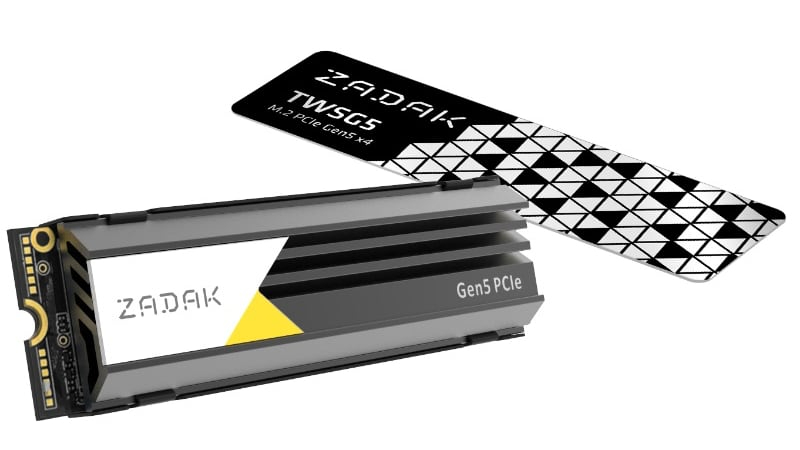Apacer's PCIe 5.0 SSDs to Bring 13 GBps Speeds to Alder Lake, Ryzen 7000
Apacer's new SSDs promise sequential reads and writes of 13,000 MBps and 12,000 MBps, respectively.
When PCIe 4.0 SSDs first hit the scene in 2019, they brought breakneck transfer speeds of around 5,000 MBps to enthusiasts. Over the years, as SSD controllers have matured and faster NAND has entered the fray, we've seen the best PCIe 4.0 SSDs surpass the 7,000 MBps sequential reads threshold and hit up against the theoretical limits of the interface. Now it's time to transition to next-generation PCIe 5.0 SSDs, and Apacer is on hand at Computex 2022 to showcase two products capable of nearly doubling the performance of their PCIe 4.0 counterparts according to WCCFTech.
The Apacer AS2280F5 PCIe 5.0 SSD boasts sequential reads of up to 13,000 MBps and sequential writes of up to 12,000 MBps. In addition, Apacer uses a relatively beefy heatsink for the SSD and backs it with a five-year warranty.

The Zadak TWSG5 from Apacer's gaming brand also features the same performance specs as the AS2280F5. However, the TWSG5 offers two different heatsink options for customers. The first is a traditional aluminum design like the one seen on the Apacer-branded SSD, while the second is an ultra-thin graphene heatsink to accommodate low-profile systems. In addition, like the Apacer AS2280F5, the Zadak TWSG5 features a five-year warranty.
Unfortunately, Apacer doesn't give us information on read/write IOPS or endurance figures. In fact, the company didn't even get us an idea of what capacities will be available for the SSDs or pricing. We also don't know what controller Apacer uses, although we expect many upcoming PCIe 5.0 SSDs to use the new Phison E26 controller.
However, we know that these new SSDs from Apacer will be fully compatible with motherboards using Intel's Z690 chipset for 12th generation Alder Lake processors. In addition, the SSDs will also be natively supported by motherboards using AMD's X670 and X670E chipsets for Zen 4 Ryzen 7000 processors.
With AMD Ryzen 7000 processors right around the corner and Intel gearing up for 13th generation Raptor Lake, we expect to see a slew of PCIe 5.0 SSD announcements in the coming months. And early adopters will likely be in for some sticker shock compared to contemporary PCIe 4.0 SSDs, just as we’ve seen with the transition from DDR4 to DDR5 memory modules for bleeding-edge PCs.
Get Tom's Hardware's best news and in-depth reviews, straight to your inbox.

Brandon Hill is a senior editor at Tom's Hardware. He has written about PC and Mac tech since the late 1990s with bylines at AnandTech, DailyTech, and Hot Hardware. When he is not consuming copious amounts of tech news, he can be found enjoying the NC mountains or the beach with his wife and two sons.
-
watzupken I feel this will require some active cooling on laptops, i.e. heatpipes from the SSD heatspread to the laptop heatsink.Reply